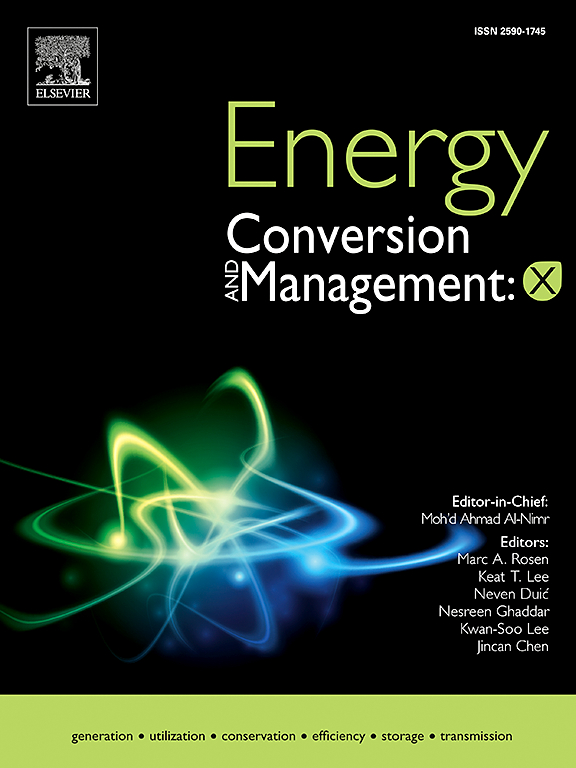伊朗能源政策的变革管理:分析从化石燃料到可再生能源的过渡过程
IF 7.6
Q1 ENERGY & FUELS
引用次数: 0
摘要
在石油资源丰富的国家,尽管可再生能源资源丰富,但从化石燃料转型面临着复杂的挑战。本研究旨在设计一个变革管理框架,以克服能源转型的挑战,并概述石油资源丰富国家的远见情景,重点是伊朗。通过对文献和官方文件的系统审查,确定了33个主要挑战,并将其分为7类。使用多标准决策(MCDM)方法对挑战进行了排名,并使用世界银行数据的时间序列分析(1990-2022)分析了与能源转型指标相关的长期趋势。采用交叉影响平衡(CIB)方法制定了合理的方案。政治、治理和体制挑战被认为是最具影响力的挑战,其次分别是基础设施、经济、地缘政治、监管、市场和环境挑战。时间序列分析显示,伊朗对化石燃料的高度依赖,与全球脱碳趋势的差距越来越大。这些发现被用来确定7种可能的情景。转型转型(情景1)和结构性停滞(情景7)分别被确定为最有利的情景和警告情景。多流框架(MSF)、倡导联盟框架(ACF)和间断平衡理论(PET)在变革管理背景下的整合被确定为减少阻力、建立共识和加速能源政策结构性改革的操作工具。拟议的框架可以帮助石油资源丰富的国家加快能源转型的决策过程。本文章由计算机程序翻译,如有差异,请以英文原文为准。
Change management in Iran’s energy policies: analyzing the transition process from fossil fuels to renewable energies
In oil-rich countries, the transition from fossil fuels, despite significant renewable energy resources, faces complex challenges. This research aims to design a change management framework to overcome energy transition challenges and to outline foresight scenarios for oil-rich countries, with a focus on Iran. Through a systematic review of the literature and official documents, 33 key challenges were identified and classified into seven groups. The challenges were ranked using a multi-criteria decision-making (MCDM) method, and long-term trends related to energy transition indicators were analyzed using time series analysis of World Bank data (1990–2022). Plausible scenarios were developed using the Cross-Impact Balance (CIB) method. Political, governance, and institutional challenges were identified as the most influential, followed by infrastructural, economic, geopolitical, regulatory, market, and environmental challenges, respectively. The time series analysis shows Iran’s high dependence on fossil fuels and a growing gap with global decarbonization trends. These findings were used to identify 7 plausible scenarios. Transformative transition (Scenario 1) and structural stagnation (Scenario 7) were identified as the most favorable scenario and the warning scenario, respectively. The integration of the Multiple Streams Framework (MSF), Advocacy Coalition Framework (ACF), and Punctuated Equilibrium Theory (PET) in the context of change management was identified as an operational tool to reduce resistance, build consensus, and accelerate structural reforms in energy policy. The proposed framework can assist in the policymaking process to accelerate the energy transition in oil-rich countries.
求助全文
通过发布文献求助,成功后即可免费获取论文全文。
去求助
来源期刊

Energy Conversion and Management-X
Multiple-
CiteScore
8.80
自引率
3.20%
发文量
180
审稿时长
58 days
期刊介绍:
Energy Conversion and Management: X is the open access extension of the reputable journal Energy Conversion and Management, serving as a platform for interdisciplinary research on a wide array of critical energy subjects. The journal is dedicated to publishing original contributions and in-depth technical review articles that present groundbreaking research on topics spanning energy generation, utilization, conversion, storage, transmission, conservation, management, and sustainability.
The scope of Energy Conversion and Management: X encompasses various forms of energy, including mechanical, thermal, nuclear, chemical, electromagnetic, magnetic, and electric energy. It addresses all known energy resources, highlighting both conventional sources like fossil fuels and nuclear power, as well as renewable resources such as solar, biomass, hydro, wind, geothermal, and ocean energy.
 求助内容:
求助内容: 应助结果提醒方式:
应助结果提醒方式:


